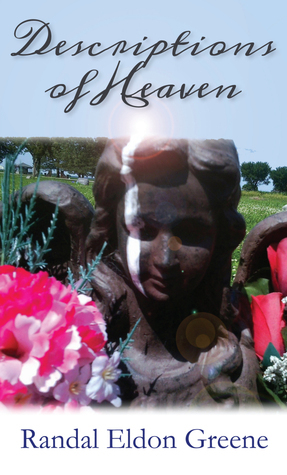
Book Review


I created this Pecha Kucha for a class in my doctoral program. My problem statement is the title. I’m thinking of changing my research focus from that exactly, because as I say below, the research has been done. This is a settled question. The problem now becomes how to get that message to stakeholders? That feels a little squishy to me to be my research because I’m so close to it, as IASL Past President and Advocacy Chair, and the chair of ILA’s Governmental Affairs Committee. So who knows. But here it is, and at the bottom as a video:
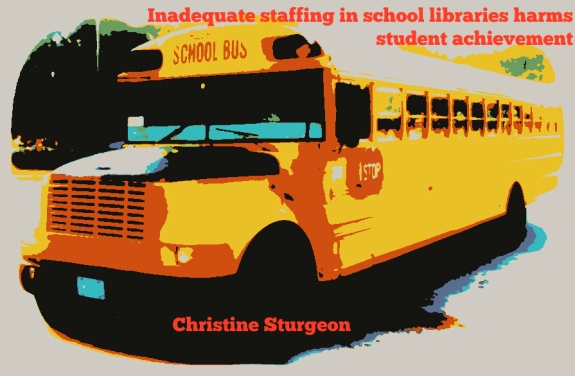
This work, “School bus” is a derivative of “2007 International Corbeil School Bus” by dflirecop, licensed under CC BY 2.0.
People have argued for centuries about the purpose of school. Is it to guide students to be good citizens and future leaders? Or to help them gain job skills so they can support a family? Is it to give students a true liberal arts education?
Whatever the case, it seems the central role of school is to educate young minds. So it’s only fitting that the school library – a repository of information, after all – should be the metaphorical if not physical center of the school.
Now, when I say “school library” you may have an outdated vision in your mind. Let me assure you, today’s school libraries – and the teacher librarians who lead them – belie that stereotype. School libraries can, should, and must be “safe, vibrant, energized information-rich environments” (Lewis & Loertscher, 2014, p. 48), led by professionals specially trained in information literacy.
And the state Department of Education knows it. Their Vision for Iowa’s School Libraries reads, “Iowa’s best schools have library programs that engage the entire school community to elevate the learning experience for all.” It describes how teacher librarians teach students critical thinking and research skills, and how they “nurture curiosity to develop in students a passion for learning for life (Iowa DE, 2013, para. 8).
In order to have that sort of impact, school library programs must be lead by full time certified teacher librarians. Impact studies in many states, including Iowa, have demonstrated an increase in students’ standardized test scores and pleasure found in reading when a school has a full time teacher librarian (Lance, Schwartz, & Rodney, 2014; Lance & Hofschire, 2012; Lance & Hofschire, 2011; Lance, Rodney & Schwartz, 2010; Lance & Schwarz, 2012; Rodney, Lance, & Hamilton-Pennell, 2002). Many of these studies show these increases cannot be explained away by other school or community conditions.
Many of these impact studies were conducted by library consultant Keith Lance. In 2009 he looked at data from the National Center for Education Statistics, “to document the impact of librarian layoffs on fourth-grade reading scores between 2004 to 2009 . . . Fewer librarians translated to lower performance – or a slower rise in scores – on standardized tests” (Lance & Hofschire, 2011, p. 29).
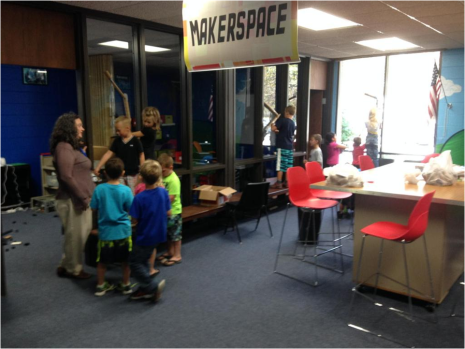
This work,“MNW Elementary Makerspace Marble Challenge”was created by Justin Daggett and used with permission.
Denice Adkins from the University of Missouri combed through PISA data and found that school libraries can positively impact poor students at such as degree as to help level the playing field. But she states, “Merely having a dedicated library space is insufficient to serve the needs of students. What is more important, especially for low performers, is having resources available and staff who can provide support” (Adkins, 2014, p. 17).
One review of the literature stated, “The existence of a positive link between school library services and academic achievement is a practically inescapable conclusion” (Chan, 2008, p. 7).
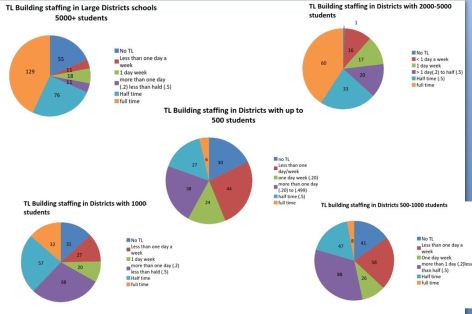
Feuerbach, S. (2014). TL building staffing in districts in Iowa. Des Moines, IA: Iowa Association of School Librarians.
In a study commissioned by the Iowa Association of School Librarians, only 8 of the 331 responding districts – 2% – had at least one full-time teacher librarian per attendance center, which is considered best practice. Five percent of the respondents – 158 schools – had no teacher librarian whatsoever (Feuerbach, 2014).
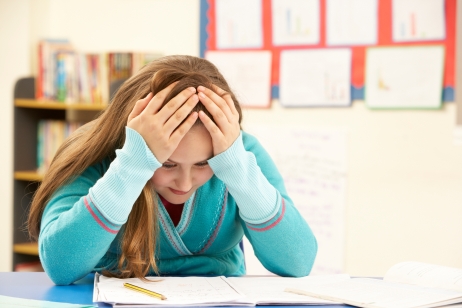
Vital Imagery Limited. (2015). Stressed schoolgirl studying in classroom [stock photo]. Retrieved from iClipart for Schools. Used with permission.
References
Adkins, D. (2014). U.S. students, poverty, and school libraries: What results of the 2009 Programme for International Student Assessment tell us. School Library Research. Retrieved from ERIC database. (EJ1043360)
Chan, C. (2008). The impact of school library services on student achievement and the implications for advocacy: A review of the literature. Access 22(4): 15-20.
Feuerbach, S. (2014). Ratio of teacher librarians to school buildings in Iowa. Des Moines, IA: Iowa Association of School Librarians.
Iowa Department of Education (2013). Vision for Iowa’s school libraries. Retrieved from https://www.educateiowa.gov/pk-12/learner-supports/school-library#Vision_for_Iowas_School_Libraries
Lance, K.C., Schwartz, B., & Rodney, M.J. (2014). How libraries transform schools by contributing to student success: evidence linking South Carolina school libraries and PASS & HSAP results. Retrieved from http://www.scasl.net/assets/phase%20i.pdf
Lance, K.C., & Hofschire, L. (2012). School librarian staffing linked with gains in student achievement, 2005 to 2011. Teacher Librarian, 39(6), 15-19.
Lance, K.C., & Hofschire, L. (2011). Something to shout about: new research shows that more librarians means higher reading scores. School Library Journal, 57(9), 28-33.
Lance, K.C., Rodney, M.J., & Schwartz, B. (2010). Idaho school library impact study – 2009: How Idaho school librarians, teachers, and administrators collaborate for student success. Retrieved from http://libraries.idaho.gov/doc/idaho-school-library-impact-study-2009
Lance, K.C., & Schwartz, B. (2012). How Pennsylvania school libraries pay off: Investments in student achievements and academic standards. Pennsylvania School Library Project. Retrieved from ERIC database. (ED543418)
Lewis, K. R., & Loertscher, D. V. (2014). The Possible Is Now. Teacher Librarian, 41(3), 48.
Rodney, M.J., Lance, K.C., & Hamilton-Pennell, C. (2002). Make the connection: Quality school library media programs impact academic achievement in Iowa. Bettendorf, IA: Iowa Area Education Agencies. Retrieved from http://www.iowaaeaonline.org/pages/uploaded_files/Make%20The%20Connection.pdf
Here’s a link to my presentation at the AEA today on the bookstore model.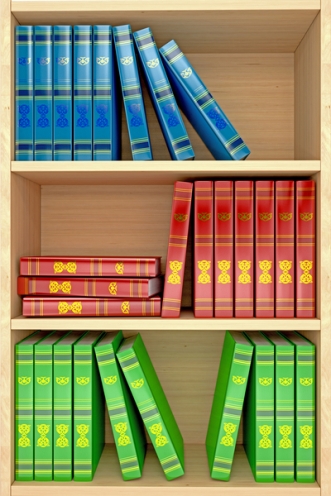
Steps:
1.Find (mostly uninterrupted) time
2.Get help if you can
3.Mostly plan your categories
4.Touch every book
5.Categorize
6.Labels
7.Signage
8.Circ system
Complete BISAC subject headings can be found here, or transcribed in my spreadsheet
Categories:
Nonfiction
FICTION
I’ve been meaning to read Mindset by Carol Dweck for a long time, but finally am forced to because it’s the first reading for my first class in my (first?) doctoral program. (Okay, okay, this better be my only doctoral program.)
Anyway, I’m only on page 8 but something hit me so profoundly that I needed to blog about it.
She writes:
To give you a better sense of how the two mindsets work, imagine – as vividly as you can – that you are a young adult having a really bad day: One day, you go to a class that is really important to you and that you like a lot. The professor returns the midterm papers to the class. You got a C+. You’re very disappointed. That evening on the way back to your home, you find that you’ve gotten a parking ticket. Being really frustrated, you call your best friend to share your experience but are sort of brushed off.
Then she talks about those with a growth mindset vs. those with a . . . set? . . . mindset (I’m not far enough to know what the opposite of growth mindset is called. [Edit: Set mindset, ha ha. I think it’s fixed mindset.]
But I don’t have to imagine her scenario because I have my own:
I was really excited, eager to start the program for my BA in elementary education, which would allow me to eventually become a librarian. I worked as a secretary and had a great boss, who allowed me to work over lunch or later on some days so I could go to class on others. Classes started in the city, about 45 minutes away, at 4:30. These were definitely designed for people already working in a school, rather than a secretary like me! But I forgot something at home, so I had to go twenty minutes the other way first. I was scooting along at a clip so I wouldn’t be late, and I got a speeding ticket. After dealing with that, I sat in my car and cried, and I had to make a decision: Was I going to go to this first class late, or just forget about the whole thing? I didn’t have the money for the program and would rely on student loans. I worked a full-time job and had five kids at home. Was this smart? Maybe I should just go home and crawl into bed.
I didn’t. And I can honestly count that decision as the one that made it so here I sit, reading this book . . . for my doctorate! Boo-ya!
Look! I was featured on CodeMonkey’s Meet the Teacher!
“I always knew I wanted to be a librarian, and being a K-12 teacher librarian means I reach nearly all the students in a community. I love inspiring kids to try something new, for example we recently started a Makerspace at the elementary school, and had a 3-day “Makerspace Kickoff.” Kids went to stations and experimented in Electronics (Snap Circuits, Makey Makeys, Squishy Circuits), Marble Run (designing a roller coaster of sorts with cardboard tubes) and of course, Coding.
Being the only Teacher Librarian in my district, it’s easy to feel isolated with what I do. But through Twitter, I have an amazing Personal Learning Network, and it’s been so much fun to meet some of those people in real life.
Being connected helps because when your network is expanded, so is your knowledge and abilities, and that helps me to be a better Teacher Librarian to my students.
I believe that in the future education will be more connected, more hands-on and more personalized. Hopefully words like “Genius Hour”, “Makerspace”, and “Student Voice” will all become household words.”
Christine Sturgeon
K-12 Teacher Librarian, Manson Northwest Webster Schools
Manson, Iowa
Follow Christine on Twitter ->
twitter.com/c_sturgeon
We’re putting together a Makerspace at the elementary school! I put a teaser in the school newsletter (page 8), and I’m using Kristin Fontichiaro’s list, “What’s in your school’s dream Makerspace?” as a starting place. I’m applying for two grants (cross my fingers) and making a project proposal for school administration. We already have 2 Makey Makeys and a Kano computer, and kids are having fun exploring those.
My definition for a Makerspace is, “A community center with tools,” with the community in this case being the students and staff at the elementary school, and tools being age-appropriate. So soon, we hope to have high-tech tools like Arduino microcontrollers and Raspberry Pi, but it also includes mid-tech tools like a digital camera as well as low-tech tools like origami paper. Makerspaces are for makers of all stripes!
Parents are coming in for Christmas concerts and book fair starting this week, so I decided to make a Christmas tree of sorts with ornaments that have low- to medium-cost items that people could donate to the cause. Want to donate? Great! Find the Amazon wish list here. (Obviously, if you have other items that would work, especially on the crafty side of things, donate away. Items don’t have to be brand new, either – if you have a half-used bag of pom poms at home in your craft supplies, we’d take it!)